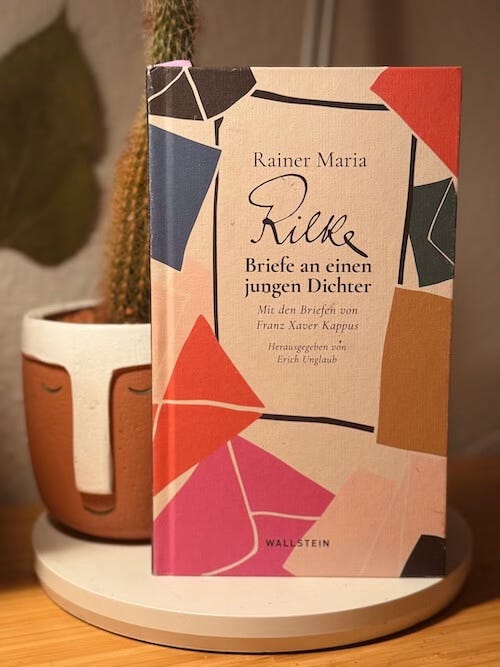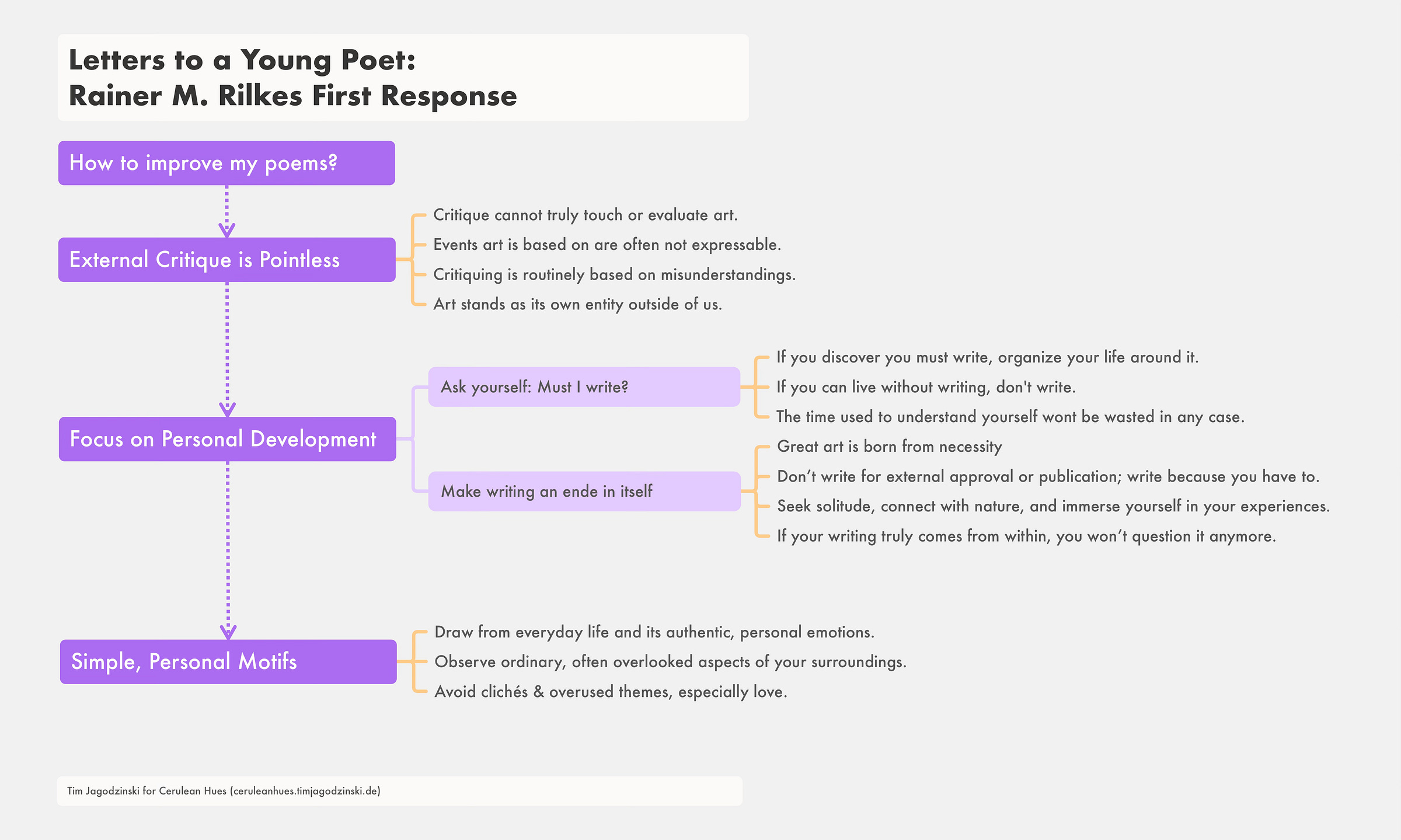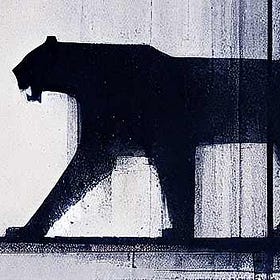How to handle critique in poetry
In part one of eleven articles about "Letters to a Young Poet" by Rainer Maria Rilke we will discuss poems and how they relate to critique. The sensitive advice Rilke gave to Franz Kappus is timeless.
“Letters to a Young Poet” contains a collection of personal letters between Franz Kappus and Rainer Maria Rilke. Rilke was a very private person; the release of these letters is a unique insight into the thoughts behind this distinguished master of poetry. The sensitive advice Rilke gave to Franz Kappus is an excellent source for modern poets to better learn how and why to write.
For this series I want to go letter by letter to find advice and insight into how Rilke thought about poetry and how we can learn from him and Kappus reaction. There are ten letters and I will provide you with a conclusion, so this article is part one of elven.
The initial letter wasn’t recorded. For this article I will provide you with an introduction to the book instead, then a summary of Rilke’s first letter and my personal interpretation and a mind map as a conclusion and for future reference.
Ultimately, I want you to read “Letters to a young poet”, as this is the only way to get all the wisdom out of it. The translation of quotes in this article were made by myself.
How the exchange started and ended
Franz Xaver Kappus was learning in a military academy and wrote poems on the side. One of his professors knew Rilke from when Rilke was at the academy. Rilke wasn’t made to become an officer and didn’t finish his education there, but because of this connection Kappus decided to write a letter to Rilke. He attached poems and was asking for a critique of them. It took Rilke a couple of months to respond and they exchanged ten letters in six years. This seems to be very slow, but not only were these letters written by hand, Rilke was moving through Europe at this time. Kappus himself said, that at some point the exchange simply stopped with out explicitness.
Finally, in 1929, three years after Rilke’s death, all the letters were published as a book. The purpose of this release was to show a personal side of Rilke, but especially his modern sentiment about politics, religion, and the avoidance of ideology.
1902: Kappus sends his first letter to Rilke.
1902–1908: They exchange ten letters.
1929: All surviving letters are published posthumously.
The letters we are talking about this time are Kappus’s first letter, written in Austria in the Fall of 1902, and Rilke’s answers that was written on the 17th February 1902 in France.
First Response from Rainer Maria Rilke
Rilke artfully rejects Kappus’s wish to critique his poetry by telling him that he has no interest in critiquing art. He argues that critique cannot touch art, because all it does is create misunderstandings in the end:
The things are not as sayable and comprehensible as people want to make us believe. Most events are unutterable, happen in a room that words will never enter and artworks are more unsayable than anything else is. They are mysterious existences, which lives move on beside ours, which will end.
— Rainer Maria Rilke
Rilke believed that art has a life on its own and is born from something in us that is hidden. This supposedly makes it immune to critique. Instead of critique, Kappus got advice. Rilke told Kappus that his poetry lacks its own style but had slight aspects of his personality. He talks about Kappus’s poem “My Soul” and that it shows that something inside him wanted to talk. Overall, Rilke says his poetry lacks independence.
Instead of providing the critique Kappus wanted, Rilke put the focus on why and how Kappus was writing. He advises that Kappus should not send poems to magazines or to compare them with others. Kappus should instead go inside himself to understand why he writes and to ask himself if he has to write and would have to do so under any circumstance. Further, if Kappus comes to the conclusion that he must write, he should then arrange his life around that need, to come closer to nature.
(This part has a double meaning. He wants to tell Kappus that he needs to come closer to “his nature”, but the act oft doing so, also means he comes closer to nature in general — because not being the person nature meant you to be, forcibly alienates you from nature and makes you depressed.)
Rilke was of the opinion that if Kappus could live without writing, he should simply stop writing at all.
He further advises Kappus to start writing in simple language about his emotions – but not poetry about love. In general, he should not write poems about common topics because it is hard to contribute something unique and valuable to a topic that is readily available, obvious for many people, and producing much material. Instead Kappus should focus on the motifs of his day to day. He should watch ordinary elements around him and construct poems with them.
Finally, he tells him that if his poetry comes from this deep introspection, he won’t even think about asking if it is good. There is no point in questioning it. He we will see in it a part of his natural possessions. A piece and a voice of his life.
An artwork is good when it is born from necessity.
— Rainer Maria Rilke, Letters to a Young Poet
Then Rilke reminds Kappus again that the outcome of this deep introspection could be that he does not have to write to live and therefore should not be a poet – even then the introspection would have been useful to guide him in his life.
Rilke sent the poems back with his response.
My Interpretation
Rilke’s response is as relevant as it ever was. The amount of attention we can court is bigger than it ever was, and sharing our writing is even easier. No handwriting is needed, no manuscripts has to be sent, we have the Internet.
His intuition is correct: critiquing any single poem, or even a collection of them, is not helpful because it’s superficial. The common denominator and source of the poetry is the author, and the author needs to improve, not the poem.
Rilke explains it differently, but he tells Kappus to not write because he wants to be read, and to deeply focus on his unique life experience instead. I’m certain if you do this, you will find your unique topics, and you will seek out the tools you need to write well and deliver them to your audience.
A major tip is to stay away from worn out, clichéd topics like love. It’s inviting because it is universal and who didn’t have a broken heart? But this is why you wont be able to add anything novel to it. (Clichés in general are off putting. You heart might be on fire, the metaphor is not.)
In conclusion I think Rilke found a very nice way, to tell Kappus that he probably had the wrong motivations for writing and needed to commit more to it, if he ever wanted to be a published poet. I don’t believe Rilke thought Kappus had no talent but he clearly told him, that he has to go dig for talent inside of him a bit more.
In the end Kappus was a pretty successful writer, but he found his success in novels.
The artists must be a world of his own and find everything in himself and in the nature he associated himself with.
— Rainer Maria Rilke, Letters to a Young Poet
Mind Map Summary
Thank you for reading part one about “Letters to a Young Poet”. At the end of the exploration of this exchange we will have one pretty large reference mind map to work with.
If you are interested in more about Rainer Maria Rilke I wrote an article about his most famous poem:
Rainer Maria Rilke, Der Panther Translation and Discussion
Before we start, I encourage you to explore the theme of this poem yourself by using these two writing prompts. If you come up with additional or even better prompts, feel free to share them in the comments!
All the Best,
Tim Jagodziński







